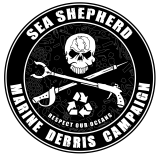News
Updates from the Field: Cocos Keeling Islands 'Trash Bash' 2022
Friday, 16 Dec, 2022
For the third year running, Sea Shepherd conducted an intensive clean-up at the Coco Keeling Islands, a remote island territory in the Indian Ocean, in December 2022.
Read all about the campaign here or scroll down to read updates from our Marine Debris Campaigner on the ground, Liza Dicks.

Update One: The Beauty of Cocos Keeling Islands
The Cocos Keeling Islands is a place like no other.
The aqua-blue crystal-clear waters of the lagoon are home to an abundance of diverse marine life.
Turtles gracefully rise to the surface for air, sharks, manta rays, and dolphins cruise in the lagoon and an array of brightly coloured parrot fish feed on the corals.
This rich ecosystem is why our dedicated marine debris team have travelled to the islands for the third year running to clean up the beaches around this stunning remote atoll and protect marine life from the scourge of plastic pollution.
Take a look at our snapshot of the beauty of the region ⬇️
Update Two: The Impact on Marine Life
Returning to Cocos Keeling Islands for the third time, Sea Shepherd’s eight dedicated Marine Debris Crew tackled the beaches across 4 of the atoll’s islands. Some of these islands are uninhabited by humans, but are home to a diverse array of marine life.
Despite our intensive clean up campaign in 2021 when many of the beaches were cleaned, this year, again the plastic had returned. Thousands of pieces of lightweight single-use packaging items such as straws, water cups, bottles, sachets and hard plastic, along with tonnes of ropes and nets littered the white sand.
Our crew had their work cut out to remove the high loading of trash, a time-consuming and tiring job requiring hours on the beach picking up the trash and then carrying hundreds of heavy bags down, some of which are counted and sorted for data collection.
We can only imagine how difficult it must be for marine life to navigate through this dense layer of plastic, and each day saw the impact on hundreds of hermit crabs trapped inside cups, containers, and bottles.
The islands are truly paradise, with the waters surrounding them protected by a marine park and they should be free of all marine plastic pollution.
It’s time for Big Plastic Producers to take responsibility.
Take a look at some images of plastic waste - and their affect on marine life - on the beaches of the Cocos Keeling Islands ⬇️
Update Three: Ghost Fishing Gear
Discarded or abandoned fishing gear (known as 'ghost gear') that washes up on remote beaches is a threat to marine life and challenging to remove from remote and isolated places.
During our campaign at the Cocos Keeling Islands, our crew removed 2.5 tonnes of ropes and nets over 13 days from the stunning beaches, ensuring that nesting turtles have a safe place to come ashore.
Ropes and nets are heavy and difficult to remove and must be cut up to carry down the beach to the nearest road or even boat.
Nearly one million tonnes of fishing gear made from high-strength plastic materials are dumped into the ocean every year and responsible for killing 136,000 dolphins, whales seals and turtles every year.
If you don’t want to contribute to this, you can take fish off your plate and be part of saving the oceans.
Take a look at ghost fishing gear removed by our crew ⬇️
Update Four: 8.2 Tonnes of Trash Removed!
In just two weeks, our eight dedicated marine debris crew members removed 8.2 tonnes of trash from the beaches of the Cocos Keeling Islands! We wanted to share a breakdown of just how much coastline was covered.
For three days, the crew camped on the uninhabited island of Direction, removing 1.4 tonnes of trash from 2km of coastline.
Next, they turned their focus to Jetty beach on West Island, where turtles graze on sea grass close to the beach. It took three days to cover 2.5kms, and the crew removed a further 1.7 tonnes of pollution.
The following five days were spent cleaning up on Pula Gangsa, which was by far the most overwhelming for our crew, with the highest density of marine plastic washing up on the shore. Sadly, this badly polluted beach is also a turtle-nesting beach. The crew spent five days cleaning the windward side, collecting 386 bags weighing over 3.6 tonnes.
In total, a staggering 5.6 tonnes of all trash removed was made up of lightweight single-use plastic items such as water cups, straws, water bottles and hard plastic pieces. The crew also removed more than two tonnes of discarded fishing gear.
Thank you to our incredible crew, who worked hard for nine hours each day on the beach to achieve this incredible result for marine life. A big thank you algo to the Shire of Cocos Keeling Islands, Australian Marine Parks, Parks Australia and the community for all their support during our campaign.
Take a look at photos of our crew in action ⬇️
Watch a short video from our Cocos Keeling Islands 2022 clean-up campaign
